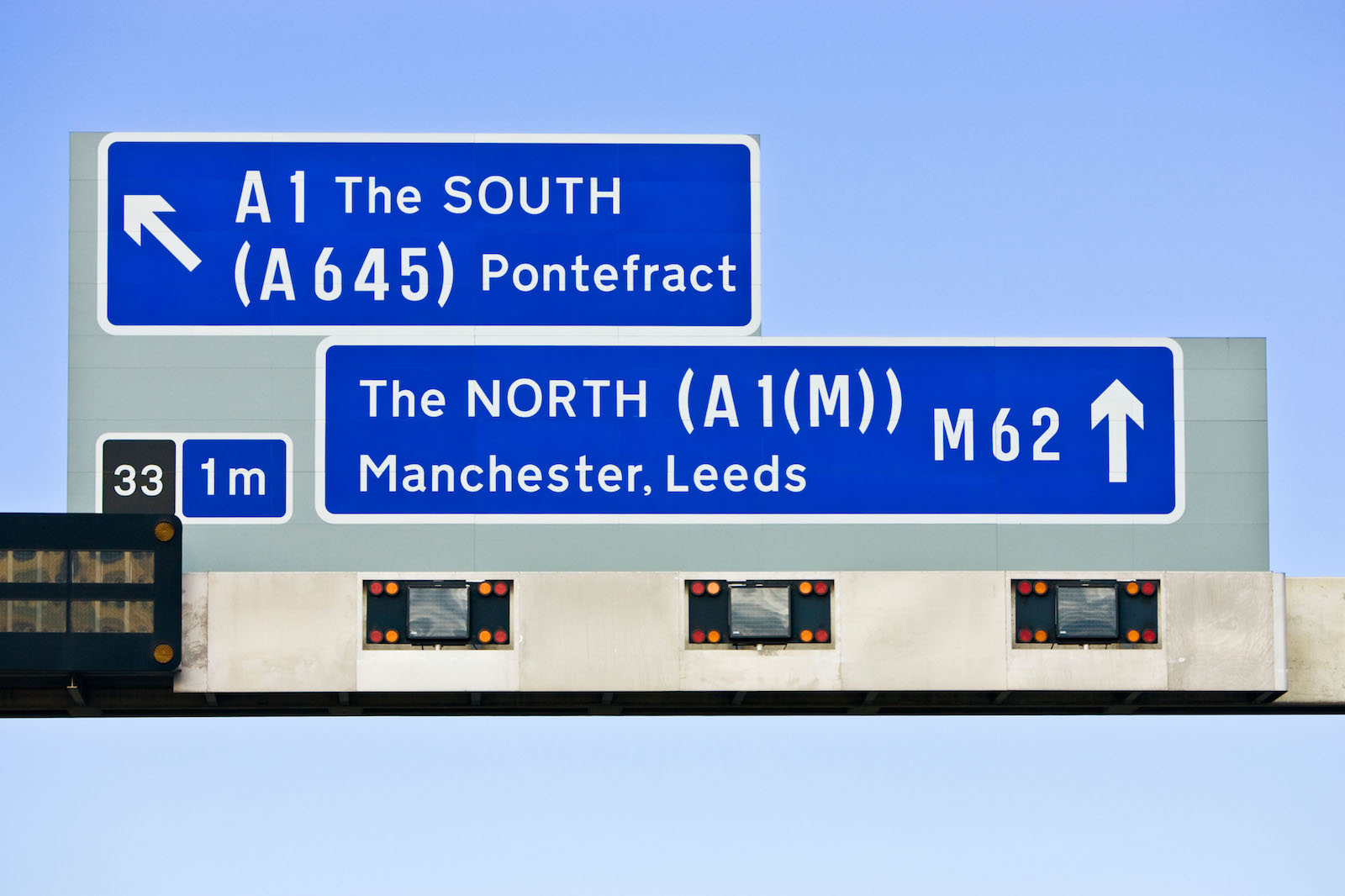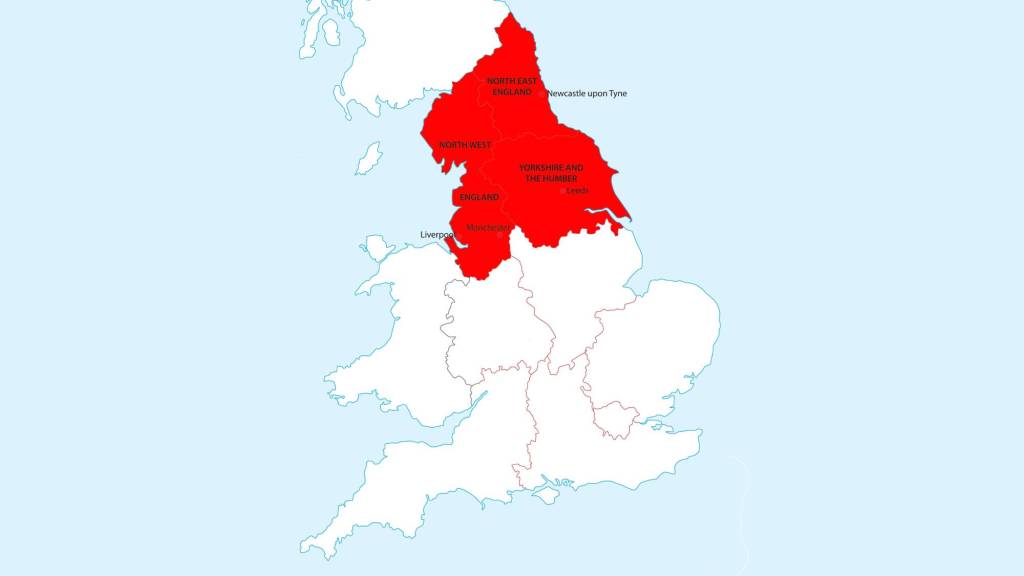Historians argue that two key periods have helped shape identity in the north of England. One is the Industrial Revolution, the other is the 1980s, when economic divisions between north and south became bitterly pronounced.
The coronavirus pandemic has once again thrown Britain’s north-south divide into sharp relief. Last month saw a standoff between Downing Street and northern leaders, as Greater Manchester Mayor Andy Burnham led the charge in protest of inadequate government support for the region, which was placed under Tier 3 restrictions against the advice of scientific advisers.
Videos by VICE
The second national lockdown, announced by Boris Johnson on Saturday, has further angered Burnham and other northern leaders. After refusing to meet the Manchester mayor’s £65 million request for business support, Chancellor Rishi Sunak has now extended the furlough scheme nationally. This has led some – including the newly-created Northern Independence Party – to call for a referendum on the creation of an autonomous “North of England”, while Manchester City Council leader Sir Richard Leese tells VICE News that recent events “show that there is strength in a unified voice coming out of Greater Manchester”. He adds: “We would always argue for greater power for local leaders.”
Despite this strong sentiment, previous attempts to devolve power to the north, such as the 2004 North East devolution referendum, have proved a failure. Could a “Northern Republic” really be possible this time?
Author Alex Niven, whose 2019 book New Model Island: How to Build a Radical Culture Beyond the Idea of England argues that England suffers from a profound lack of identity, calls for radical political reform of the country. However, he says: “It will take a hundred Andy Burnhams to rally the cause of the north, because the north has been doing badly for a long time – for decades, if not centuries – and a lot of the time, it’s basically sat there and taken it, with a few exceptions.”
As University of Central Lancashire’s Professor Ewa Mazierska writes in Heading North: The North of England in Film and Television: “One aspect of the ‘master narrative’ of the north, on which 19th and 20th century literature had a particular influence, reflects the rapid industrialisation and then post-industrial decline of this region. This narrative, in which the north can be summarised as ‘Povertyshire’ and literal and cultural ‘Darkshire’ can be traced back to authors such as Charles Dickens, Elizabeth Gaskell, D.H. Lawrence and George Orwell.”
Former Manchester Labour councillor for Withington, Daniel Gillard, agrees with this line of thought.
“I think, in the past, despite the obvious north-south divide, the north didn’t feel confident enough in its own identity, certainly in the 20th century, to take too seriously the idea of a Northern Assembly or Parliament,” he tells VICE News. “It’s something that hasn’t existed since the days when York was the capital of England, which was centuries ago.”
In New Model Island, Northumberland-based Niven suggests that it will take a radical left-wing government to bring about devolution of power to the north, or indeed other regions outside London. While he offers practical suggestions for how this might be achieved, he isn’t for a “Northern Republic”, driven by something akin to the nationalism that has inspired independence and devolution referendums in Scotland and Wales.
“That would seem to me a bit ridiculous and contradictory to the whole notion of why the north should have more power,” he says. “The reason we’ve got into this mess is because of British nationalism and the imperial dynamic of that, which is very centralised.”
Instead, Niven thinks the answer lies in a more nuanced regionalism in Britain, which he describes as “about where you live and your attachment to the landscape in a way that’s a bit more enlightened than this idea of a nation that’s often about ethnicity and race”. Any devolution agenda should be based on changing the “fundamental nature of British government and society”, including outdated constitutional structures like the monarchy and the House of Lords.

For Gillard, however, the way in which power is devolved in Britain isn’t the most important thing. “Rather, it’s that power itself is devolved,” he says. “What’s most important is restoring a real connection between ordinary people and the institutions that are meant to serve them. This connection feels very broken, especially right now.”
On the ground in Manchester, even those who aren’t necessarily for northern independence warn about the dangers of a centralised approach to both policy and the pandemic.
“The approach from London fundamentally prevents there being any trust between the north and the south,” says Tim Heatley, the property developer profiled on the recent BBC documentary Manctopia: Billion Pound Property Boom. “The north has lost trust in the government because they say something and they do something else.”
Describing how this affects his own business, Heatley adds: “On a practical level, we’ve got a thousand contractors on our construction sites at any one time, and what’s worrying is that there’s a direct correlation between compliance with COVID regulations and trust in the government. The less trust there is, the less compliance, which then affects lives and livelihoods.”
Matthew Krysko owns Manchester PR company We Are Indigo, which helped launch the second instalment of Freight Island. The socially distanced market and events space was forced to close after just one weekend, due to the new lockdown.
“Schools are remaining open and universities are driving up infection rates,” Krysko says. “It seems clear that the Conservatives just aren’t for culture. People talk about devolution when they aren’t happy, but I think separating is ‘divide and conquer’. To fight this government, we are better together.” He cites the national #WeMakeEvents campaign to save the live events sector as an example of collectivism in action.
Austin Collings, creative director of experimental Salford venue The White Hotel, thinks the government’s handling of the pandemic must be properly addressed before northern independence is pursued.
“We can’t think about Manchester or the north governing itself before this current government is investigated for their COVID crimes, which are extensive,” he says. “It’s corporate manslaughter and monetary aid corruption. Therein after, we can question the role of these governments in their entirety.”
Collings also notes that the practicalities of the impending lockdown are likely to affect people’s willingness to campaign for northern devolution or independence. “People don’t tend to riot in the winter,” he adds.
The prospect of a Northern Republic may be shaky, but Niven is still hopeful for change, despite the fact New Model Island’s relatively positive ending, written during former Labour leader Jeremy Corbyn’s ascension in the 2017 General Election, seems like a lifetime ago.
“I think we need to dig in for a long-term fight,” he says, predicting it’ll be a decade before a left-wing government takes power and there’s a chance of the kind of decentralisation he writes about. “It’ll take a bit longer than I thought when I was writing the book, but I think there’ll be a breakthrough eventually.”
Given the renewed anger at the north-south divide laid bare by coronavirus – and Burnham’s vow that northerners won’t forget – maybe that breakthrough is a little closer than it seems.
More
From VICE
-

Nvidia -

Silent Hill 2 key art -

Photo via Jimmy Eat Brisket -

Derek White/Getty Images


